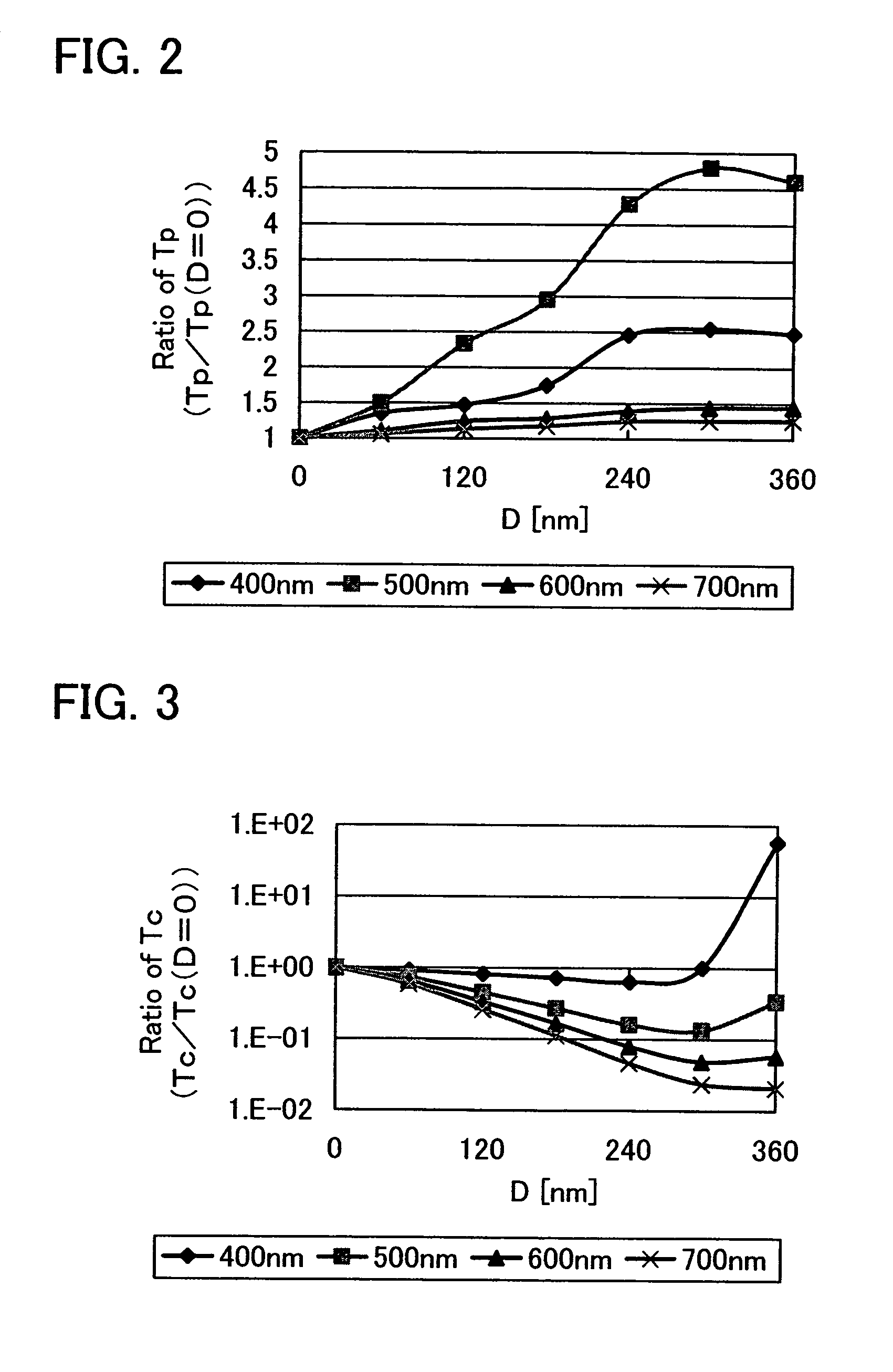Polarizer and display device including polarizer
a technology of polarizer and display device, which is applied in the direction of polarising elements, instruments, coatings, etc., can solve the problems of difficulty in realizing a polarizer having a wire grid structure with a sufficient ratio of transmittance tsub>p /sub>, transmittance tsub>c/sub>, etc., to achieve the effect of improving mechanical strength and improving optical properties of the polarizer
- Summary
- Abstract
- Description
- Claims
- Application Information
AI Technical Summary
Benefits of technology
Problems solved by technology
Method used
Image
Examples
embodiment mode 1
[0069]FIG. 4A and FIG. 4B illustrate an example of a polarizer having a wire grid structure of the present invention. A manufacturing method of the polarizer will be described below. FIG. 4A is a cross-sectional view taken perpendicular to a substrate surface, and FIG. 4B is a perspective view corresponding to the diagram in FIG. 4A.
[0070]First, a light-transmitting substrate 401 is prepared. A light-transmitting material such as glass, ceramics, or a resin can be used for the light-transmitting substrate 401. Further, a high refractive index glass substrate of which refractive index is controlled by controlling impurities in glass can be used for the light-transmitting substrate 401.
[0071]Next, a wire grid structure is formed over the light-transmitting substrate 401. The wire grid structure shown in FIG. 4A and FIG. 4B may be formed by suitably using a nanoimprint method such as a photo nanoimprint method or a thermal nanoimprint method; a photolithography method; an E-beam lithog...
embodiment mode 2
[0077]FIG. 6 illustrates another example of a polarizer having a wire grid structure of the present invention. In this embodiment mode, a polarizer is provided in which a first group of metal wires 602 and a second group of metal wires 603 are covered with a light-transmitting member 604 in order to increase mechanical strength of the wire grid structure. The second group of metal wires 603 have their centers in different arrangement from the centers of the first group of metal wires 602. The centers here refer to the centers of the cross sections taken in the short-side direction of the metal wires, which are perpendicular to the long-side direction thereof, that is, the width direction of the metal wires. For example, in the case where the cross-sections have a quadrangular shape, intersection points of the two lines connecting opposite corners may be a center. Further, the line connecting the centers of plural cross sections of one metal wire can be called a central axis, which i...
embodiment mode 3
[0084]FIG. 7 illustrates another example of a polarizer having a wire grid structure of the present invention. In this embodiment mode, a polarizer in which grooves are formed on a light-transmitting substrate 701, a first group of metal wires 702 are provided on the grooves of the substrate, and a second group of metal wires 703 are provided on projections of the substrate. A method for manufacturing such a polarizer will be described below.
[0085]First, a light-transmitting substrate 701 is prepared. A light-transmitting material such as glass, ceramics, a resin or the like can be used for the light-transmitting substrate 701. Further, a high refractive index glass substrate of which refractive index is controlled by controlling impurities in glass can be used for the light-transmitting substrate 701.
[0086]Next, the light-transmitting substrate 701 is processed to form grooves with a width of (L+2S). As a method for processing the light-transmitting substrate 701, a laser etching m...
PUM
| Property | Measurement | Unit |
|---|---|---|
| thickness | aaaaa | aaaaa |
| width | aaaaa | aaaaa |
| thickness | aaaaa | aaaaa |
Abstract
Description
Claims
Application Information
 Login to View More
Login to View More - R&D
- Intellectual Property
- Life Sciences
- Materials
- Tech Scout
- Unparalleled Data Quality
- Higher Quality Content
- 60% Fewer Hallucinations
Browse by: Latest US Patents, China's latest patents, Technical Efficacy Thesaurus, Application Domain, Technology Topic, Popular Technical Reports.
© 2025 PatSnap. All rights reserved.Legal|Privacy policy|Modern Slavery Act Transparency Statement|Sitemap|About US| Contact US: help@patsnap.com



